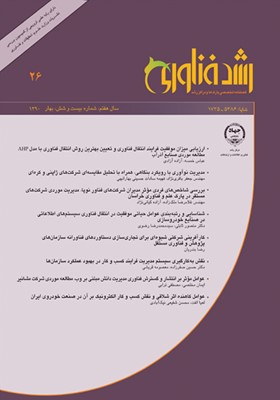شناسايي و رتبهبندي عوامل حياتي موفقيت در انتقال فناوري سيستمهاي اطلاعاتي در صنايع خودروسازي
محورهای موضوعی : انتقال فناوري و تجاريسازي پژوهشمنصور ثابتی 1 , سید محمد رضا رضوی 2 *
1 - -
2 - -
کلید واژه: عوامل حياتي موفقيت, سيستمهاي اجرايي ساخت, تکنولوژي سيستمهاي اطلاعاتي , برنامه ريزي منابع سازماني ,
چکیده مقاله :
اطلاعات نيروي محرکه اقتصاد و دانش امروزي است و ابزار بکارگيري آن سيستمهاي اطلاعاتي ميباشد. با وجود منافع زياد بکارگيري سيستم هاي اطلاعاتي، هنوز ريسک بالاي شکست بر پياده سازي اين پروژه ها سنگيني مي نمايد. عوامل حياتي موفقيت وجود دارند و بايد آنها را شناسائي و کشف کرد. عدم توجه به اين عوامل کل سيستم و فرآيند را با خطر اساسي و شکست پروژه در اجرا مواجه می سازد. در اين تحقيق با شناسايي چارچوب هاي موجود براي انتقال تکنولوژي سيستمهاي اطلاعاتي و شاخص هاي هر کدام از طبقات اين چارچوبها، سعي بر آن شده است که اين عوامل را در سازمانهاي ايراني که تمايل به انتقال اين تکنولوژي را دارند ارزيابي و رتبه بندي گردد. طبقاتي که براي اين شاخصها ميتوان در نظر گرفت شامل سه طبقه عوامل سازماني، عوامل تاکتيکي و عوامل فني ميباشد. بعضي از عوامل کليدي موفقيت که شناسايي شدند عبارتند از : تعهد و حمايت مديريت ارشد سازمان، درک واضح از اهداف کسب و کار و نيازمنديهاي سازمان، آمادگي سازمان و زيرساخت مناسب IT (عوامل سازماني)- مدير پروژه قوي، تيم مناسب و متخصص (عوامل تاکتيکي)- آموزش کافي ، مشارکت کاربران در پروژه و حفظ نيروي متخصص و آموزش ديده (عوامل فني). اين تحقيق در میان کارشناسان حوزه IT و IS شرکتهای مرتبط با صنعت خودروسازی نظیر شرکتهای پارس خودرو، سایپا و سازه گستر سایپا صورت گرفته است. این شرکتها تجربه انتقال تکنولوژی سیستمهای اطلاعاتی نظیر MES و ERP را در سازمان خود داشته اند.
Information is the driving force for today's knowledge economy and information systems are tools for information application. While numerous benefits of information systems are proven, substantial risk of failure is still burdening implementation of such projects. To reduce the risk, attention must be paid to critical success factors. After reviewing the relevant literature, success factors for the transfer of information system technologies are identified. Using such factors, this research evaluates and prioritizes them in the context of Pars Khodro and Saipa Auto Companies, as well as Sazeh Gostar Parts Co. in Iran. A questionnaire was administered among 32 IS/IT experts and consultants in those firms. The chosen firms have had experience with the transfer of information system technologies like MES and ERP. The proposed classification in this research divides critical success factors into three broad categories: organizational factors, tactical factors, and technical factors. Consistent with others' findings in the area of information systems, this research finds that the managerial, organizational and tactical factors dominate the technical aspect, and special attention to the former reduces the risk of failure associated with the implementation of information systems. As one of the primary objectives of this research, it has been found that the most important critical success factors in each category are: 1) Among organizational factors, the support and commitment of top management, and clear understanding of business objectives and organizational requirements are the most important; 2) Within tactical factors, effective project management and competent teams are critical; and 3) Among technical factors, adequate training, extensive organizational participation, and retention of skilled employees are important.

